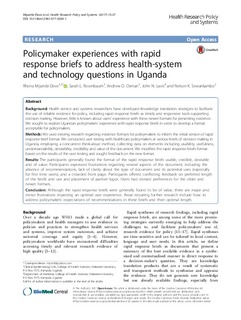| dc.description.abstract | Background: Health service and systems researchers have developed knowledge translation strategies to facilitate the use of reliable evidence for policy, including rapid response briefs as timely and responsive tools supporting decision making. However, little is known about users' experience with these newer formats for presenting evidence. We sought to explore Ugandan policymakers' experience with rapid response briefs in order to develop a format acceptable for policymakers. Methods: We used existing research regarding evidence formats for policymakers to inform the initial version of rapid response brief format. We conducted user testing with healthcare policymakers at various levels of decision making in Uganda, employing a concurrent think-aloud method, collecting data on elements including usability, usefulness, understandability, desirability, credibility and value of the document. We modified the rapid response briefs format based on the results of the user testing and sought feedback on the new format. Results: The participants generally found the format of the rapid response briefs usable, credible, desirable and of value. Participants expressed frustrations regarding several aspects of the document, including the absence of recommendations, lack of clarity about the type of document and its potential uses (especially for first time users), and a crowded front page. Participants offered conflicting feedback on preferred length of the briefs and use and placement of partner logos. Users had divided preferences for the older and newer formats. Conclusion: Although the rapid response briefs were generally found to be of value, there are major and minor frustrations impeding an optimal user experience. Areas requiring further research include how to address policymakers' expectations of recommendations in these briefs and their optimal length. | |
